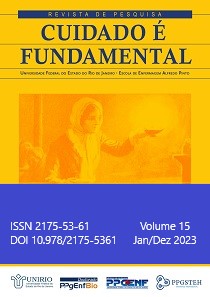Factors associated with gestational weight gain above recommended:
systematic review
DOI:
https://doi.org/10.9789/2175-5361.rpcfo.v15.11778Keywords:
Pregnancy, Pregnant Woman, Gestational Weight Gain, Risk FactorsAbstract
Objective: to estimate the factors that are related to gestational weight gain above the recommended level. Methods: the search was carried out in May 2021 in the following databases: LILACS, PubMed and COCHRANE, with the descriptors: “Pregnant women”; “Gestational weight gain”; “Pregnancy”; “Gestation”; “Risk Factors”; “Socioeconomic Factors”. The study protocol was registered at PROSPERO under number CRD42021258655. The selection of articles was carried out with a focus on the guiding question “Which factors are associated with gestational weight gain above the recommended?”. Selected articles were analyzed using the “JBI Critical Appraisal Checklist” and “Grading of Recommendations Assessment, Development and Evaluation” systems. Results: 15 articles were selected. The most prevalent factors were: pre-pregnancy weight, tobacco use, parity and family income. Conclusion: estimating these factors contributes to obtaining a better gestational period, childbirth and postpartum period.
Downloads
References
REFERÊNCIA
Instituto Brasileiro de Geografia e Estatística - IBGE. Pesquisa nacional de saúde 2019: atenção primária à saúde e informações antropométricas: Brasil / IBGE, Coordenação de Trabalho e Rendimento, [Ministério da Saúde], 2020 [acesso em 18 de junho de 2021]. Disponível em: https://biblioteca.ibge.gov.br/visualizacao/livros/liv101758.pdf
Silva LO, Alexandre MR, Cavalcante ACM, Arruda SPM, Sampaio RMM. Adequate versus inadequate weight gain and socioeconomic factors of pregnant women followed up in primary care. Rev Bras Saúde Mater Infant. 2019; 19(1): 99-106 [acesso em 05 de maio de 2021]. Disponível em: https://www.scielo.br/j/rbsmi/a/9BVqdgCnGfGscLNSfd4zQ3B/?format=pdf&lang=pt
Magalhães EIS, Maia DS, Bonfim CFA, Netto MP, Lamounier JA, Rocha DS. Prevalência e fatores associados ao ganho de peso gestacional excessivo em unidades de saúde do sudoeste da Bahia. Rev Bras Epidemiol. 2015; 18(4): 858-69 [acesso em 05 de maio de 2021]. Disponível em: https://www.scielo.br/j/rbepid/a/zZGfkz8wLqWvPV9xgDtg5sn/?lang=pt
Padilha PC, Saunders C, Machado RCM, Silva CL, Bull A, Sally EOF, et al. Associação entre o estado nutricional pré-gestacional e a predição do risco de intercorrências gestacionais. Rev Bras Ginecol Obstet. 2007 Out; 29(10): 511-18 [acesso em 05 de julho de 2021]. Disponível em: https://www.scielo.br/j/rbgo/a/TdxHtdWGCTpdvxcbcqnZY6r/?format=pdf&lang=pt.
Ovalle A, Martínez MA, Fuentes A, Marques X, Vargas F, Vergara P, et al. Obesity, a risk factor for ascending bacterial infection during pregnancy. Rev Med Chil. 2016; 144(4): 476-82 [acesso em 07 de julho de 2021]. Disponível em: https://www.scielo.cl/scielo.php?script=sci_arttext&pid=S0034-98872016000400008&lng=en&nrm=iso&tlng=en.
Van Der Burg JW, Allred EM, Kuban K, O’shea TM, Dammann O, Leviton A. Maternal obesity and development of the preterm newborn at 2 years. Acta Paediatr. 2015 Set; 104(9): 900–03 [acesso em 24 de junho de 2021]. Disponível em: https://www.ncbi.nlm.nih.gov/pmc/articles/PMC4537690/.
Rasmussen KM, Yaktine AL, Institute of Medicine (US) and National Research Council (US) Committee to Reexamine IOM Pregnancy Weight Guidelines. Weight Gain During Pregnancy: Reexamining the Guidelines. Washington (DC): National Academies Press (US); 2009 [acesso em 24 de junho de 2021]. Disponível em: https://www.ncbi.nlm.nih.gov/books/NBK32813/.
National Institute for Health Research. PROSPERO: International prospective register of systematic reviews. [acesso em 28 abril 2021]. Disponível em: https://www.crd.york.ac.uk/prospero/.
Munn Z, Stern C, Aromatraris E, Lockwood C, Jordan Z. What kind of systematic review should conduct? A proposed typology and guidance for systematic reviewers in the medical and health sciences. BMC Med Res Methodol. 2018: 18(1): 5 [acesso em 17 abril 2021]. Disponível em: https://www.ncbi.nlm.nih.gov/pmc/articles/PMC5761190/.
The Joanna Briggs Institute. Checklist for Systematic Reviews and Research Syntheses. The Joanna Briggs Institute Critical Appraisal tools for use in JBI Systematic Reviews. 2017 [acesso em 26 de abril de 2021]. Disponível em: https://jbi.global/sites/default/files/2019-05/JBI_Critical_Appraisal-Checklist_for_Systematic_Reviews2017_0.pdf.
Diretrizes metodológicas: Sistema GRADE – Manual de graduação da qualidade da evidência e força de recomendação para tomada de decisão em saúde / Ministério da Saúde, Secretaria de Ciência, Tecnologia e Insumos Estratégicos, Departamento de Ciência e Tecnologia. – Brasília: Ministério da Saúde, 2014 [acesso em 22 de abril de 2021]. Disponível em: https://bvsms.saude.gov.br/bvs/ct/PDF/diretriz_do_grade.pdf.
Guyatt G, Oxman AD, Akl Ea, Kunz R, Vist G, Brozek J, et al. GRADE guidelines:1. Introduction GRADE evidence profiles and summary of findings tables. J Clin Epidemiol 2011; 64: 383-94 [acesso em 18 de abril de 2021]. Disponível em: https://pubmed.ncbi.nlm.nih.gov/21195583/.
Page MJ, McKenzie JE, Bossuyt PM, Boutron I, Hoffmann TC, Mulrow CD, Shamseer L, et al. The PRISMA 2020 statement: an updated guideline for reporting systematic reviews. BMJ 2021; 372(71) [acesso em 18 de abril de 2021]. Disponível em: https://www.bmj.com/content/372/bmj.n71.
Yeo S, Crandell JL, Jones-Vessey K. Adequacy of Prenatal Care and Gestational Weight Gain. J Womens Health. 2016; 25(2): 117-23 [acesso em 18 de maio de 2021]. Disponível em: https://www.ncbi.nlm.nih.gov/pmc/articles/PMC4761831/.
Cheney K, Berkemeier S, Sim KA, Gordon A, Black K. Prevalence and predictors of early gestational weight gain associated with obesity risk in a diverse Australian antenatal population: a cross-sectional study. BMC Pregnancy Childbirth. 2017 Set; 17(1): 296 [acesso em 18 de maio de 2021]. Disponível em: https://www.ncbi.nlm.nih.gov/pmc/articles/PMC5590236/.
Dolin CD, Gross RS, Deierlein AL, Berube LT, Katzow M, Yaghoubian Y, et al. Predictors of Gestational Weight Gain in a Low-Income Hispanic Population: Sociodemographic Characteristics, Health Behaviors, and Psychosocial Stressors. Int J Environ Res Public Health. 2020; 17(1): 352 [acesso em 19 de maio de 2021]. Disponível em: https://www.e-publicacoes.uerj.br/index.php/demetra/article/view/36842/30833.
Manera F, Höfelmann DA. Excesso de peso em gestantes acompanhadas em unidades de saúde de Colombo, Paraná, Brasil. Demetra: Alimentação, Nutrição & Saúde. 2019 Set;14 [acesso em 23 de maio de 2021]. Disponível em: https://www.e-publicacoes.uerj.br/index.php/demetra/article/view/36842.
Paulino DSM, Pinho-Pompeu M, Raikov F, Freitas-Jesus JV, Machado HC, Surita FG. The Role of Health-related Behaviors in Gestational Weight Gain among Women with Overweight and Obesity: A Cross-sectional Analysis. Rev Bras Ginecol Obstet. 2020; 42(6): 316-324 [acesso em 06 de maio de 2021]. Disponível em: https://www.scielo.br/j/rbgo/a/JgrDCgMtHcjmV33jRYKBSCc/?lang=en
Lindberg S, Anderson C, Pillai P, Tandias A, Arndt B, Hanrahan L. Prevalence and Predictors of Unhealthy Weight Gain in Pregnancy. WMJ. 2016; 115(5): 233-37 [acesso em 20 de maio de 2021]. Disponível em: https://www.ncbi.nlm.nih.gov/pmc/articles/PMC5195875/.
Galin J, Abrams B, Leonard SA, Matthay EC, Goin DE, Ahern J. Living in Violent Neighbourhoods is Associated with Gestational Weight Gain Outside the Recommended Range. Paediatr Perinat Epidemiol. 2017 Jan; 31(1): 37-46 [acesso em 18 de maio de 2021]. Disponível em: https://www.ncbi.nlm.nih.gov/pmc/articles/PMC5195875/.
McDonald SD, Yu ZM, Blyderveen SV, Schmidt L, Sword W, Vanstone M, et al. Prediction of excess pregnancy weight gain using psychological, physical, and social predictors: A validated model in a prospective cohort study. PLoS One. 2020; 15(6) [acesso em 18 de maio de 2021]. Disponível em: https://journals.plos.org/plosone/article?id=10.1371/journal.pone.0233774.
Alba JJF, Páez CM, Sánchez ÁV, Pazos ES, Macías MCG, Negro ES et al . Sobrepeso y obesidad como factores de riesgo de los estados hipertensivos del embarazo: estudio de cohortes retrospectivo. Nutr. Hosp. 2018 Ago; 35(4): 874-880 [acesso em 18 de maio de 2021]. Disponível em: https://scielo.isciii.es/scielo.php?script=sci_arttext&pid=S0212-16112018000800018.
Teles, LFS. Relação entre ganho de peso gestacional e composição corporal do concepto. São Paulo. Tese [Nutrição em Saúde Pública]. Faculdade de Saúde Pública da Universidade de São Paulo; 2021 [acesso em 18 de setembro de 2021]. Disponível em: https://www.teses.usp.br/teses/disponiveis/6/6138/tde-05042021-161019/publico/TelesLFS_DR_O.pdf
Poston L, Caleyachetty R, Cnattingius S, Corvalán C, Uauy R, Herring S, et al. Preconceptional and maternal obesity: epidemiology and health consequeces. The Lancet Diabetes & Endocrinology. 2016; 4(12): 1025-1036 [acesso em 24 de setembro de 2021]. Disponível em: https://www.thelancet.com/journals/landia/article/PIIS2213-8587(16)30217-0/fulltext
Gonçalves CV, Mendoza-Sassi RA, Cesar JA, Castro NB, Bortolomedi AP. Índice de massa corporal e ganho de peso gestacional como fatores preditores de complicações e do desfecho da gravidez. Rev Bras Ginecol Obstet. 2012 Jul; 34(7): 304-9 [acesso em 18 de outubro de 2021]. Disponível em: https://www.scielo.br/j/rbgo/a/LhxQVfcrvk8FBGz8JkYVDqF/?format=pdf&lang=pt.
Ferreira VA, Magalhães R. Obesidade entre os pobres no Brasil: a vulnerabilidade feminina. Ciênc. Saúde Coletiva. 2011; 16(4): 2279-87 [acesso em 08 de outubro de 2021]. Disponível em: https://www.scielo.br/j/csc/a/8dYt5SQKpNBF4JvpNSL5sZQ/?format=pdf&lang=pt.
Chin JR, Krause KM, Østbye T, Chowdhury N, Lovelady CA, Swamy GK. Gestational weight gain in consecutive pregnancies. Am J Obstet Gynecol. 2010 Set; 203(3): 279 [acesso em 05 de outubro de 2021]. Disponível em: https://www.ajog.org/article/S0002-9378(09)01526-9/fulltext.
Hartley E, McPhie S, Skouteris H, Fuller-Tyszkiewicz M, Hill B. Psychosocial risk factors for excessive gestational weight gain: A systematic review. Women Birth. 2015 Dez; 28(4): 99-109 [acesso em 18 de 27 de setembro de 2021]. Disponível em: https://www.womenandbirth.org/article/S1871-5192(15)00047-5/fulltext.
Nast M, Oliveira A, Rauber F, Vitolo MR. Ganho de peso excessivo na gestação é fator de risco para o excesso de peso em mulheres. Rev Bras Ginecol Obstet. 2013 Dez; 35(12): 536-40 [acesso em 02 de agosto de 2021]. Disponível em: https://www.scielo.br/j/rbgo/a/JSyhK3ytGg59HkFnMYg7yKH/?format=pdf&lang=pt.
Gaillard R, Durmuş B, Hofman A, Mackenbach JP, Steegers EAP, Jaddoe VWV. Risk factors and outcomes of maternal obesity and excessive weight gain during pregnancy. 2013 Mai; 21(5): 1046-1055 [acesso em 09 de outubro de 2021]. Disponível em: https://onlinelibrary.wiley.com/doi/10.1002/oby.20088.
Monthé-Drèze C, Rifas-Shiman SL, Gold DR, Oken E, Sem S. Maternal Obesity and Offspring Cognition: The Role of Inflammation. Pediatr Res. 2019 May; 85(6): 799–806 [acesso em 30 de setembro de 2021]. Disponível em: https://www.ncbi.nlm.nih.gov/pmc/articles/PMC6494697/.
Eriksson JG, Sandboge S, Salonen MK, Kajantie E, Osmond C. Long-term consequences of maternal overweight in pregnancy on offspring later health: Findings from the Helsinki Birth Cohort Study. Annals of Medicine. 46:6: 434-438 [acesso em 28 de outubro de 2021]. Disponível em: https://www.tandfonline.com/doi/full/10.3109/07853890.2014.919728.
Published
Versions
How to Cite
Issue
Section
License
Copyright (c) 2022 Revista de Pesquisa Cuidado é Fundamental Online

This work is licensed under a Creative Commons Attribution-NonCommercial-NoDerivatives 4.0 International License.
TRANSFER AGREEMENT COPYRIGHT I transfer copyright of the article to the Journal of Care Survey is Fundamental - Online - RPCF, so it is accepted due to electronic publishing. The copyright includes the right to reproduce in whole or in part by any means, distributing that article, including figures, photographs, and any translations. The author can also print and distribute copies of your article, stating that since the rights belong to RPCF. I declare that this manuscript is original and has not been submitted for publication, in whole or in part to other online journals or not, so BMMC in the Annals of scientific events or book chapters.






























